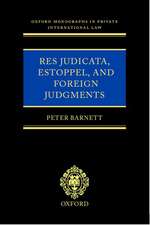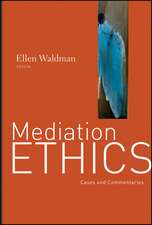Ethics in International Arbitration
Autor Catherine Rogersen Limba Engleză Hardback – 25 sep 2014
| Toate formatele și edițiile | Preț | Express |
|---|---|---|
| Paperback (1) | 543.25 lei 31-37 zile | |
| OUP OXFORD – 25 sep 2014 | 543.25 lei 31-37 zile | |
| Hardback (1) | 1087.18 lei 31-37 zile | |
| Oxford University Press – 25 sep 2014 | 1087.18 lei 31-37 zile |
Preț: 1087.18 lei
Preț vechi: 1535.93 lei
-29% Nou
Puncte Express: 1631
Preț estimativ în valută:
208.03€ • 217.78$ • 172.13£
208.03€ • 217.78$ • 172.13£
Carte tipărită la comandă
Livrare economică 25-31 martie
Preluare comenzi: 021 569.72.76
Specificații
ISBN-13: 9780195337693
ISBN-10: 0195337697
Pagini: 410
Dimensiuni: 178 x 253 x 27 mm
Greutate: 0.88 kg
Editura: Oxford University Press
Colecția OUP Oxford
Locul publicării:Oxford, United Kingdom
ISBN-10: 0195337697
Pagini: 410
Dimensiuni: 178 x 253 x 27 mm
Greutate: 0.88 kg
Editura: Oxford University Press
Colecția OUP Oxford
Locul publicării:Oxford, United Kingdom
Recenzii
Rogers book, as a literary work, is rich. It is vibrantly written and exposes the reader to a thoughtful mix of cross-disciplinary learning. Even looking at the work's more prosaic features, there is much to appreciate. Despite the abundance of arbitration-related books currently on offer, Professor Rogers Ethics in International Arbitration makes a singular contribution to the literature. For its mapping of third-party funding issues alone it is worth having, but that is just one of its unique contributions. The scope and depth of the book are indeed impressive, and the flair with which it is executed is refreshing. The book fills a distinctive space and is destined to become one of the arbitration world's oft-cited references.
Professor Rogers has written a book that reshapes the intellectual landscape of this fundamental dimension of international arbitration and that is also a pleasure to read. All who labor in international arbitration are indebted to her.
Rogers has a gift for seeing both sides of an argument, yet pointing us firmly to the path of principles likely to enhance arbitration's role in fair and efficient vindication of economic rights.
Catherine Rogers has done the arbitration community an immense service with this book. The issue of ethics in international arbitration is one that is of the highest importance. As the industry grows exponentially and as those who are engaged in this vital enterprise come from the many diverse regions of the world, there is now, more than ever, an urgent need for practitioners to have access to an authoritative source that analyses the issues, lays out the considerations and presents thoughtful answers to the many facets of ethicality in international arbitration. This book is that source. Catherine has examined the issue of ethics from all the significant vantage points - of arbitrators, lawyers, experts and even funders - in this magnificent work which is destined to become an essential part of the knowledge base of every serious practitioner and student of arbitration.
At last, not only a book that addresses the long-neglected topic of ethics in international arbitration, but THE definitive book on the subject. Prof. Catherine Rogers' treatise, Ethics in International Arbitration (Oxford Press 2014) covers the field comprehensively, both in terms of theory and existing international norms. Prof. Rogers was the first commentator to publish articles that attempted a methodical approach to counsel ethics in international arbitration, more than a decade ago, and now this book takes the broader subject to its logical conclusion?the ethical obligations of counsel, arbitrators, expert witnesses, and third-party funders in international arbitration. This book is a necessary addition to the library of any specialist, or anyone aspiring to be a specialist, in the field of international arbitration. It will one day be considered a classic, necessary reading in the field, around which courses will be designed. I highly recommend it.
Lawyers consider themselves to be professionally ethical. But ethics is relative and not everyone plays by the same rules. This book provides a masterful insight into the ethical issues affecting international arbitration and analyses many of the questions that will need to be addressed by the arbitral community if arbitration to be retain its legitimacy.
Catherine Rogers had established herself as the leading scholar on the ethics of international arbitration. With this seminal book, she now demonstrates how important her work is for more general theoretical debates about legal ethics, legal theory, and the foundations of the global legal order. Knitting together insights from her extensive engagement with real world cases, with a deep understanding of sophisticated debates across a broad range of academic disciplines, Professor Rogers has produced a dazzling synthesis of theory and practice. Whether one is interested in dispute resolution, regulation, the sociology of the legal profession, or global governance - or the intersection of all of the above - this book will be required reading for anyone seeking to understand the power of grounded theory to shape how we understand and act in the world.
Having regularly used Professor Catherine Rogers' articles and other ethics work in our day-to-day practice, I enthusiastically join the chorus of appreciation for her new book: 'at last!'
Professor Catherine Rogers' latest book goes further than its title suggests. Under the concept of "ethics", it embraces all the challenges international arbitration faces today, and it does so in a comprehensive and captivating way. Also, this approach addresses from a new perspective an old nagging question: the "rules of ethics" counsel follow originate from the national procedural rules they were trained in and are familiar with.
The book provides valuable food for thought and a compelling argument for some form of professional regulation in international commercial arbitration.
Reconciling highly territorial and often varied rules of professional responsibility with the increasingly borderless responsibilities of lawyers is one of the great challenges facing today's legal profession. The challenge is most acute in the context of international arbitration, where lawyers from different nations represent parties from different nations before arbitrators from different nations, often in a nation different from all of these. Catherine Rogers' book addresses head-on the numerous practical questions that arise in this complex context, while offering a brilliant and sensible prescription for the future regulation of professional responsibilities across borders. Ethics in International Arbitration is a seminal contribution to the literature on transnational law practice by one of the leading scholars of our time.
Professor Rogerss Ethics in International Arbitration is to be welcomed and celebrated for providing an original and viable path to a community full of questions about the ethical regulation of its participants. While the book is certainly ambitious, it is also grounded in reality It is a seminal contribution to the study of ethics in international arbitration, and is destined to be widely read for many years to come.
Professor Rogers has written a book that reshapes the intellectual landscape of this fundamental dimension of international arbitration and that is also a pleasure to read. All who labor in international arbitration are indebted to her.
Rogers has a gift for seeing both sides of an argument, yet pointing us firmly to the path of principles likely to enhance arbitration's role in fair and efficient vindication of economic rights.
Catherine Rogers has done the arbitration community an immense service with this book. The issue of ethics in international arbitration is one that is of the highest importance. As the industry grows exponentially and as those who are engaged in this vital enterprise come from the many diverse regions of the world, there is now, more than ever, an urgent need for practitioners to have access to an authoritative source that analyses the issues, lays out the considerations and presents thoughtful answers to the many facets of ethicality in international arbitration. This book is that source. Catherine has examined the issue of ethics from all the significant vantage points - of arbitrators, lawyers, experts and even funders - in this magnificent work which is destined to become an essential part of the knowledge base of every serious practitioner and student of arbitration.
At last, not only a book that addresses the long-neglected topic of ethics in international arbitration, but THE definitive book on the subject. Prof. Catherine Rogers' treatise, Ethics in International Arbitration (Oxford Press 2014) covers the field comprehensively, both in terms of theory and existing international norms. Prof. Rogers was the first commentator to publish articles that attempted a methodical approach to counsel ethics in international arbitration, more than a decade ago, and now this book takes the broader subject to its logical conclusion?the ethical obligations of counsel, arbitrators, expert witnesses, and third-party funders in international arbitration. This book is a necessary addition to the library of any specialist, or anyone aspiring to be a specialist, in the field of international arbitration. It will one day be considered a classic, necessary reading in the field, around which courses will be designed. I highly recommend it.
Lawyers consider themselves to be professionally ethical. But ethics is relative and not everyone plays by the same rules. This book provides a masterful insight into the ethical issues affecting international arbitration and analyses many of the questions that will need to be addressed by the arbitral community if arbitration to be retain its legitimacy.
Catherine Rogers had established herself as the leading scholar on the ethics of international arbitration. With this seminal book, she now demonstrates how important her work is for more general theoretical debates about legal ethics, legal theory, and the foundations of the global legal order. Knitting together insights from her extensive engagement with real world cases, with a deep understanding of sophisticated debates across a broad range of academic disciplines, Professor Rogers has produced a dazzling synthesis of theory and practice. Whether one is interested in dispute resolution, regulation, the sociology of the legal profession, or global governance - or the intersection of all of the above - this book will be required reading for anyone seeking to understand the power of grounded theory to shape how we understand and act in the world.
Having regularly used Professor Catherine Rogers' articles and other ethics work in our day-to-day practice, I enthusiastically join the chorus of appreciation for her new book: 'at last!'
Professor Catherine Rogers' latest book goes further than its title suggests. Under the concept of "ethics", it embraces all the challenges international arbitration faces today, and it does so in a comprehensive and captivating way. Also, this approach addresses from a new perspective an old nagging question: the "rules of ethics" counsel follow originate from the national procedural rules they were trained in and are familiar with.
The book provides valuable food for thought and a compelling argument for some form of professional regulation in international commercial arbitration.
Reconciling highly territorial and often varied rules of professional responsibility with the increasingly borderless responsibilities of lawyers is one of the great challenges facing today's legal profession. The challenge is most acute in the context of international arbitration, where lawyers from different nations represent parties from different nations before arbitrators from different nations, often in a nation different from all of these. Catherine Rogers' book addresses head-on the numerous practical questions that arise in this complex context, while offering a brilliant and sensible prescription for the future regulation of professional responsibilities across borders. Ethics in International Arbitration is a seminal contribution to the literature on transnational law practice by one of the leading scholars of our time.
Professor Rogerss Ethics in International Arbitration is to be welcomed and celebrated for providing an original and viable path to a community full of questions about the ethical regulation of its participants. While the book is certainly ambitious, it is also grounded in reality It is a seminal contribution to the study of ethics in international arbitration, and is destined to be widely read for many years to come.
Notă biografică
Catherine A. Rogers, is Professor of Law and International Affairs, and Paul & Marjorie Price Faculty Scholar at Penn State Law. She is also Professor of Ethics, Regulation & the Rule of Law, and Co-Director of the Institute for Ethics, Regulation & Commercial Law, at Queen Mary, University of London. She is a Reporter for the American Law Institute on the Restatement (Third) of the U.S. Law of International Commercial Arbitration, and the author of a series of widely-cited articles about the need for clearer ethical regulation in international arbitration. These works have been published over the past decade and have played an influential role in various law reform efforts. Today, Professor Rogers teaches and lectures throughout the world on issues of international arbitration, ethics, and globalization of the legal profession. Professor Rogers is also actively engaged in various projects to implement in practice many of the ideas and proposals developed in her scholarly work.











